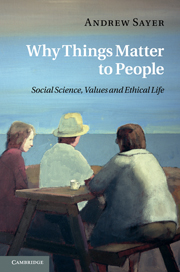Book contents
- Frontmatter
- Contents
- Acknowledgements
- 1 Introduction: a relation to the world of concern
- 2 Values within reason
- 3 Reason beyond rationality: values and practical reason
- 4 Beings for whom things matter
- 5 Understanding the ethical dimension of life
- 6 Dignity
- 7 Critical social science and its rationales
- 8 Implications for social science
- Appendix: Comments on philosophical theories of ethics
- References
- Index
4 - Beings for whom things matter
Published online by Cambridge University Press: 05 June 2012
- Frontmatter
- Contents
- Acknowledgements
- 1 Introduction: a relation to the world of concern
- 2 Values within reason
- 3 Reason beyond rationality: values and practical reason
- 4 Beings for whom things matter
- 5 Understanding the ethical dimension of life
- 6 Dignity
- 7 Critical social science and its rationales
- 8 Implications for social science
- Appendix: Comments on philosophical theories of ethics
- References
- Index
Summary
It is not even known at all to us what the human being now is, although consciousness and the senses ought to instruct us in this; how much less will we be able to guess what one day he ought to become. Nevertheless, the human soul's desire for knowledge snaps very desirously at this object, which lies so far from it, and strives, in such obscure knowledge, to shed some light.
(Kant, cited in Allen Wood, Kant and the Problem of Human Nature)Introduction
Why do people care about things? Why do things matter to them? In particular, why do they have ethical concerns about how people treat one another, and perhaps other species too, and concerns about how their social world is organized? Or, to put it more formally, what is it about people that makes them both ethical subjects and objects of ethical concern? Some sociologists might be tempted to say that it's norms or discourses that make people do these things, not their human nature, and hence that all these things are socially constructed. But while norms and discourses are important they don't seem to work on non-humans – on lumps of rock or plants – so there must be something about humans that makes them susceptible to such norms and discourses. Some of the answers to these questions are already implicit in the last two chapters; here I shall make them explicit.
- Type
- Chapter
- Information
- Why Things Matter to PeopleSocial Science, Values and Ethical Life, pp. 98 - 142Publisher: Cambridge University PressPrint publication year: 2011



